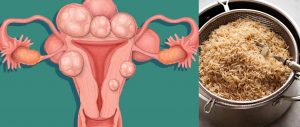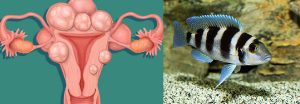7 foods for shrinking fibroids….What foods can you eat to shrink fibroids?
Also known as myomas, uterine fibroids or leiomyomas; fibroids are abnormal growths (usually benign tumours) in the uterus. Fibroids are made of tissues or muscles formed in the uterine walls. They can be caused by hormonal fluctuations (mainly excessive production of estrogen). Which, in turn triggers abnormal growth of cells, and then development of fibroids. Reports have it that the prevalence of women with fibroids is about 80%. And you’re more at risk of developing it if there’s a family history. Symptoms of fibroids include infertility (difficulty in conceiving), miscarriages, heavy menstrual bleeding, pain, anemia, and constipation. However, only few of women with fibroids come down with clinical manifestation.
While in some cases, fibroids may not require treatment; it can however be managed though healthy diets. There are certain foods that can help shrink fibroids, manage symptoms and complications. This, we will be discussing in this article.
Read on.
Foods that can help shrink fibroids
Excessive weight has been shown to increase fibroids risk. Fiber rich foods can help promote weight loss. Losing weight in turn prevents or slows down fibroids growth.
Compiled below is a list of foods that can help you manage fibroids, mainly foods rich in dietary fiber. Consumption of these foods will help balance estrogen levels and control weight.
7 foods for shrinking fibroids
Here are 7 foods that can help shrink fibroids:
1. Fruits and Vegetables:
Fruits and vegetables like tomatoes, apples, and cabbage are good food sources for shrinking fibroids because of they contain high fiber content that helps with detoxification process. Fruits and vegetables help remove toxins and other waste materials from your body. Additionally, they contain vitamins good for general health. They can help control weight and reduce excessive estrogen.

2. Legumes:
Leguminous crops such as beans and peas are another food item on the list. They contain fiber in sufficient amounts that helps flush out toxins from the body. Legumes also contains properties that help shrink fibroids by regulating hormone balance in women.

3. Garlic and Onions:
Onions and garlic contain antioxidants that helps protect the body against diseases. They do this by fighting off free radicals capable of causing damage to body cells including increasing the risk of fibroids development. The combo of garlic and onions help to melt or shrink fibroids.

4. Non-gluten grains:
Carbohydrates rich foods that do not contain gluten are nutrient dense and can help with fibroids shrinking. Non-gluten grains such as brown rice, millet, long grain rice, wild rice and many more contain vitamins and minerals that can help improve overall health and control weight.

5. Dairy products:
Dairy products such as eggs, milk, yoghurt and fish can help with fibroids shrinking. They are a great source of omega 3 fatty acids necessary for optimal health. That’s not all, they contain minerals such as magnesium, calcium and phosphorus that may help control hormonal irregularities that could interfere with women health and their reproductive system.

6. Cold water fish:
Cold water fish such as sardines, tuna, mackerel and salmon contain essential fatty acids that can help maintain hormonal balance. They also contain anti-inflammatory properties that can help with easing fibroids symptoms.

7. Flaxseed:
One of the many beneficial properties of this food is its ability to help trigger damaged estrogen replacement. Flaxseed also helps prevent fibroid growth by lowering estrogen levels in the body. This is due to the presence of phytoestrogens.

Other tips that can help manage fibroids development and improve symptoms include:
👉Avoidance of sugary foods
👉Engaging in stress management routines
👉Regular exercise
👉Avoid consumption of red meats and caffeinated products
👉Reduce blood pressure
👉Avoid alcohol and smoking
Conclusion
Please note that fibroids aren’t cancerous or always life threatening. However, sometimes can cause complications or health problems. If you feel any symptoms of fibroids, please it is advisable you see your doctor. He/she will recommend what’s the best option for you – surgery, drug therapy or other fibroids treatment and also put you on the best dietary plan.
Stella-maris Achumba
This aticle is the intellectual property of www.nimedhealth.com.ng




















